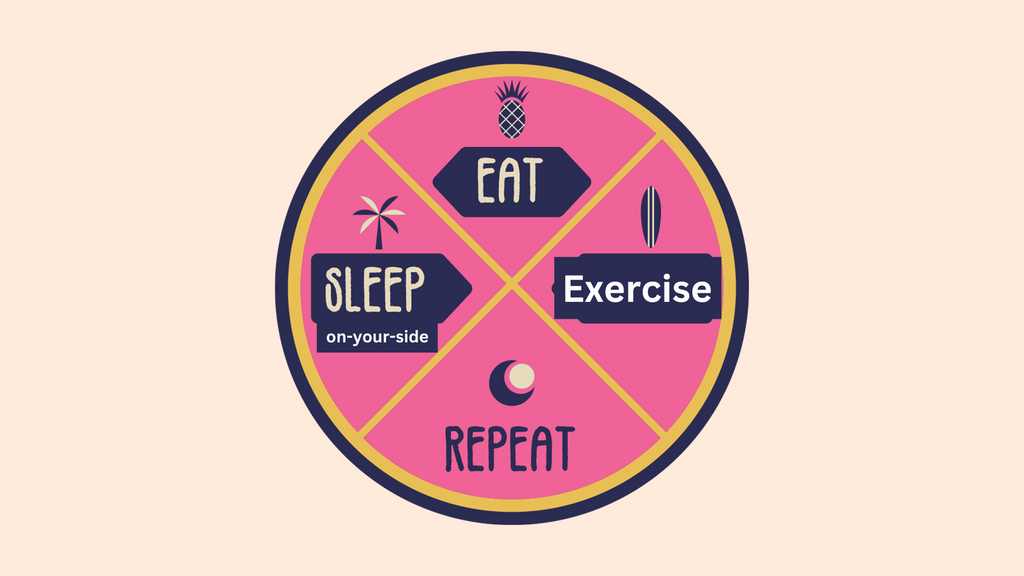Discover the Power of Sleep: The Overlooked Pillar of Optimal Health

Sleep, often considered the third pillar of health alongside nutrition and physical activity, plays a pivotal role in our overall well-being. While many of us prioritize a balanced diet and regular exercise, the significance of a good night's sleep is frequently overlooked. This article delves deep into the intricate relationship between these three pillars, emphasizing why sleep should be promoted as an essential component of health.
The importance of sleep in overall health cannot be overstated. Just as a nutritious diet fuels our body and exercise strengthens it, sleep rejuvenates and heals us. It's during this restful period that our body undergoes various processes, from cellular repair to cognitive consolidation.
Recent studies, notably, this one from Sleep Foundation's Guide on Physical Activity and Sleep have highlighted the need to promote sleep health in public health agendas across the globe. As the research suggests, sleep is as crucial as nutrition and physical activity in ensuring holistic health.

The Relationship Between Diet, Exercise, and Sleep
-
Diet, Exercise, and Sleep Interconnection:
- All three are intertwined and have a profound impact on our well-being.
- A balanced diet provides the necessary nutrients, exercise keeps the body active and fit, and sleep ensures recovery and rejuvenation.
- Neglecting one can have cascading effects on the other two.
-
Impact on Overall Well-being:
- A nutritious diet ensures optimal body function.
- Regular exercise boosts mental health and physical stamina.
- Adequate sleep enhances mood, cognitive function, and overall health.
Diet's Role in Health and Sleep
| Dietary Component | Health Impact | Sleep Impact |
|---|---|---|
| Balanced Diet | Reduces risk of diseases like heart disease and diabetes | Ensures restful sleep |
| Caffeine | Increases alertness | Can disrupt sleep patterns |
| High-Calorie Foods | Risk of obesity | May lead to sleep disruptions |
-
Overall Health Impact:
- A balanced diet affects every aspect of a person's health.
- Eating healthily reduces the risk of numerous health conditions, including heart disease, stroke, and diabetes.
- Diet also influences mental health. Studies suggest that certain diets may reduce the risk of developing depression and anxiety.
-
Connection with Sleep:
- What we eat directly impacts our sleep quality.
- Consuming caffeine, especially closer to bedtime, can make falling asleep more challenging.
- Eating too close to bedtime or having a diet high in calories or fat may disrupt sleep. On the other hand, diets rich in certain nutrients like calcium, magnesium, and vitamins A, C, D, and E can promote better sleep.
Exercise's Influence on Health and Sleep
| Exercise Type | Health Benefit | Sleep Benefit |
|---|---|---|
| Aerobic | Improves cardiovascular health | Enhances sleep quality |
| Resistance Training | Strengthens muscles and bones | Can lead to deeper sleep |
| Regular Movement | Reduces risk of chronic diseases | Helps in maintaining sleep rhythm |
-
Immediate and Long-term Benefits:
- Exercise benefits nearly every system in the body.
- Immediate effects include reduced anxiety, lowered blood pressure, and better sleep.
- Consistent exercise offers more long-term benefits like better weight management and stronger bones.
-
Improvement in Sleep Quality:
- A substantial amount of research shows that regular exercise can improve sleep.
- Both aerobic exercises, like cardio and running, and resistance exercises, like weightlifting, can enhance sleep quality.
- However, the timing of exercise is crucial. Morning or afternoon workouts can aid sleep, but exercising too close to bedtime might disrupt it.
By understanding the intricate relationship between diet, exercise, and sleep, we can make informed decisions to lead a healthier life. As we continue in Part 2, we'll delve deeper into practical ways to improve sleep through diet and exercise, ensuring a holistic approach to health.
Improving Sleep Through Diet and Exercise
Sleep Hygiene: The Foundation of Restful Nights
Sleep hygiene refers to the habits and practices that promote consistent, restful sleep. While most are aware of the importance of diet and exercise, sleep is often relegated to the background. However, understanding and implementing good sleep hygiene can be transformative for overall health.
-
Dietary Recommendations for Better Sleep:
- Avoid caffeine late in the day.
- Ensure a balanced intake of nutrients like calcium, magnesium, and vitamins A, C, D, and E.
- Refrain from heavy meals close to bedtime.
-
Exercise Recommendations:
- Engage in aerobic exercises like cardio and running.
- Incorporate resistance training for muscle strength and better sleep.
- Avoid strenuous workouts close to bedtime.
| Sleep Hygiene Tips | Benefit |
|---|---|
| Consistent Sleep Schedule | Regulates body's internal clock |
| Comfortable Sleep Environment | Reduces disturbances and promotes deep sleep |
| Limiting Screen Time Before Bed | Reduces exposure to blue light, aiding melatonin production |
| Relaxation Techniques | Reduces stress and anxiety, promoting restful sleep |
| Avoiding Large Meals Before Bed | Prevents digestive discomfort and potential sleep disruptions |
The Subtle Benefits of Side-Sleeping
Side-sleeping, especially on the left side, has been linked to numerous health benefits, from improved digestion to better brain health. Using aids like the Rematee.com Bumper Belt can ensure consistent side-sleeping, preventing individuals from rolling onto their backs and potentially snoring or experiencing sleep apnea.
-
Pros of Side-Sleeping:
- Reduces the risk of sleep apnea.
- Aids in better digestion.
- Reduces heartburn and acid reflux.
- Improves brain health by promoting waste clearance.
- Reduces snoring.
-
Cons of Side-Sleeping:
- Might cause shoulder or arm numbness.
- Potential for hip or lower back pain.
- Can lead to facial wrinkles.
- Might cause sagging breasts.
- Pressure on the stomach can cause discomfort.
FAQs
-
Why is sleep often overlooked in health discussions?
- Sleep, unlike diet and exercise, is passive and often not seen as an "activity". However, its restorative functions are crucial for overall health.
-
How does diet directly impact sleep quality?
- Dietary choices, like caffeine intake or heavy meals before bedtime, can disrupt sleep patterns. Conversely, a balanced diet can promote restful sleep.
-
Can exercise help combat sleep disorders like insomnia?
- Yes, regular exercise has been shown to improve sleep quality and reduce the severity of sleep disorders like insomnia.
-
What are the dangers of neglecting sleep in a healthy lifestyle?
- Chronic sleep deprivation can lead to various health issues, from obesity to cardiovascular diseases and impaired cognitive functions.
-
How can side-sleeping benefit overall health?
- Side-sleeping, especially with aids like the Rematee.com Bumper Belt, can reduce snoring, improve digestion, and promote better brain health.

Leave a comment